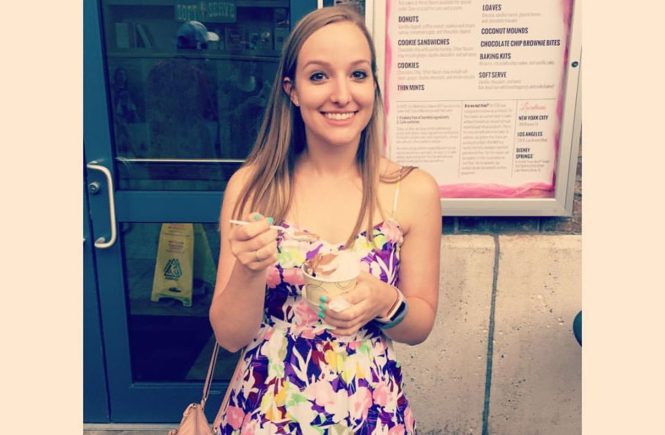Figuring out what I wanted to do for my wedding food was one of the most stressful things for me when I first started wedding planning. I’ve never even eaten at a wedding before, how was I going to figure out what to do at mine? How would I possibly feel comfortable eating something that a caterer made?
Well, I think I’ve figured it out. In this post I will share how I chose my wedding caterer and what I discussed with my caterer leading up to the wedding.
DECISIONS TO MAKE BEFORE MEETING WITH CATERERS
Before you start calling/meeting with different catering companies there are a few things you should decide.
1. Type of Meal Service
Most caterers offer buffet style, plated meals, or family style meal services. Before calling you should decide what type of meal service you are interested in so that you can discuss that specifically with the caterer.
My fiance and I were most interested in having a buffet style so that our guests had the flexibility to pick what they want to eat while at the wedding (as opposed to plated meals where guests decide in advance).
2. Type of Menu
If you have your heart set on a certain cuisine, it is important to start thinking about the type of menu you are looking for before you talk to a caterer. Some people opt for casual style food like BBQ whereas other couples go for more formal menus.
3. Whether the Entire Menu Should Be Allergen-Free
Decide in advance whether you are comfortable with your allergen(s) being in any of the foods on your menu. Someone with an airborne allergy would likely prefer that the entire menu is free from their allergen, but someone with a less severe allergy may be okay with some of the menu items containing their allergen.
Personally I decided I would feel most comfortable with my menu being free from any dairy, that way I don’t have to worry about coming in contact with my allergen on my wedding day. I also wanted to minimize any cross contamination risk in the kitchen between my meal and the rest of the catering food- but more on that later.
4. Budget/Headcount
Consider what budget you are comfortable with before you call a catering company. Also get an idea of approximately how many guests you will invite because this will be one of the caterer’s first questions. Don’t worry too much about the exact guest count, most caterers will let you confirm the final number much closer to your wedding date.
5. Extras (Coffee Bar, etc.)
Catering companies can also provide extra food stations like a coffee bar, candy bar, maybe adding extra desserts, etc. We really wanted to have a fancy coffee bar at our wedding so this was something I made sure to discuss with the caterer.
6. Your Own Comfort Level/Needs
Before you even begin talking to a caterer, decide what YOU will need to hear to feel comfortable. When I was reviewing catering companies I thought, okay, what do I need to hear from the catering company that would make me want to hire them and what are my red flags.
I personally wanted to speak directly to the chef that would be making my food, and I wanted to hear about their experience working with food allergies. You know your allergy, and you should feel empowered to get your own read on a caterer/chef just like you would at a restaurant.
7. Make a List of Caterers to Call
Write out a list of caterers you want to contact. Talk to your venue and see if they require you to use any of their preferred caterers or offer some sort of benefit if you use a preferred caterer.
Research your area on WeddingWire or the Knot for caterers that get good reviews and offer the type of menu you are looking for. Then make a list of the catering companies with phone numbers so it is quick and easy to call and take notes.
8. List Out Your Questions
Before I called any catering companies, I listed out all of the questions I wanted to ask to make sure I wouldn’t forget anything.
MEETING WITH CATERERS
Follow these steps as you talk to each caterer.
1. Try to Talk Directly to the Chef
If you feel comfortable talking with someone else at the catering company, go for it. Personally I needed to talk to the chef that would actually be preparing my food in order to feel comfortable with the responses I was getting to my questions.
Sometimes someone on the business/management side who is not also involved in the kitchen may not know what is going on in the kitchen. Similar to restaurants, do you feel better when you get to talk to a restaurant manager or the actual chef?
2. Ask About Experiences with Allergies
Ask them if they have worked with food allergies before. Almost all will say yes, partly because they know that is what you want to hear. Feel free to dig in deeper and ask for examples or what allergens they have experience with, severity levels, etc.
It is a whole lot different to work with someone who is lactose intolerant versus allergic to milk. Gauge the caterer’s experience level and don’t rule them out if they haven’t worked with your exact allergy. Make sure you can talk to the chef and if the chef seems like they can accommodate you and make you feel comfortable, they are worth trying.
3. Discuss Process for Wedding Day, Tasting Meeting, etc.
Ask the caterer what their usual process looks like for a wedding. Do they have tastings in advance? How are those planned? What happens on the day of the wedding? Are there any other meetings they will schedule with you?
The caterer I chose did do a tasting meeting where my fiance and I could sample menu items. Since it was several items at once including some that took longer to prepare, the caterer would prepare these in advance. I’ll share more details on our tasting and menu plan in the Tasting Meeting section below!
4. Take Notes!
You will NOT remember every detail of what you talked about on calls with any wedding vendors, I promise. It helps so much to take notes during the conversation that you can refer back to later. Be sure to also get the name of the person you spoke with and ask for a phone number and email address.
5. Schedule Tastings/Meeting
Schedule your tasting and decide how you want to handle that. Are you comfortable trying menu items that the caterer may have to prepare well in advance before you arrive? Is your caterer willing to meet with you before they start cooking that day? Determine what your options are and make your decision based on your personal comfort level.
TASTING MEETINGS
Here’s how I handled planning for my wedding meal and our tasting meeting.
My Wedding Plan
I only feel comfortable eating at a restaurant if I can speak with the chef and review ingredients right before they make my food. This way I know exactly what goes into it and there is little room for error or cross contamination.
The only way I would feel comfortable eating at my wedding is if the chef was able to prepare something for me at the kitchen at our venue. Then I could check in with him to confirm ingredients and that clean pans were used.
My allergy is the last thing I want to worry about on an already stressful day where I am supposed to be enjoying myself. My chef at the catering company we ended up hiring was able to make this work for me.
(If you’re curious he is planning on making me a filet mignon – pan seared, roasted potatoes made with olive oil, and steamed broccoli. You’ll notice these are all simple foods, no complex sauces or places where dairy could hide easily. But I love steak and this will still feel like a nice fancy meal for me.)
We decided to make the entire menu dairy-free for our wedding. Although there will likely be some cross contamination risk in the catering shared kitchen, the menu should be mostly if not completely dairy-free. I will still only be eating the meal prepared for me by the chef at our venue kitchen because this is what makes me most comfortable.
Our Tasting Meeting
So for our tasting meeting, my fiance (and my parents) tried several menu items that were prepared without dairy according to my caterer. I didn’t eat anything at the tasting since the food had to be prepared well in advance (so I couldn’t check with the chef immediately before the food was cooked). Instead I focused on making sure we decided on a menu that my fiance loved and confirming my meal plan with the chef who would be at my wedding.
We also used our tasting meeting time to add some extras to our catering order including a coffee bar with soy and almond creamers (instead of dairy) and a seasonal fruit platter.
WHAT I PLAN TO DO NEXT
Next we will have a follow up meeting with our caterer closer to the wedding to confirm the food plan and final headcount for our guests.
In this meeting I will make sure to confirm the plan for my meal with my chef and make sure I communicate all of my needs including:
- Ensuring that none of my food is prepped in advance or offsite (sometimes chefs will marinate things ahead of time or may forget to bring ingredient labels)
- Reminding him that I need to read labels/packaging before the food is cooked
- Confirming that clean pans should be used at our venue kitchen
On the wedding day I plan to check in with my chef sometime after cocktail hour and before dinner starts to review ingredients.
That’s all I’ve got for now! I’ll definitely do a follow up post after our wedding to share how our catering experience went.
BONUS TIPS!
- Start planning your wedding catering as far in advance as possible. Doing anything last minute is more stressful but especially an aspect of planning that’s more stressful for someone with allergies. It will feel good to have your plan in place.
- Follow your gut and do what makes you comfortable. I have a friend with a similar allergy to me who felt comfortable talking to her chef in advance and eating the catering food that the caterer prepared in advance at her wedding. If it works for you and makes you happy, great! I decided I would feel better with a slightly different plan and that is fine too. What works for someone else doesn’t have to work the same for you.
- Stand your ground, even if someone insists that everything is fine and you have nothing to worry about. Seriously if you don’t feel completely comfortable, communicate with your caterer to find a solution that will make you feel confident to eat on your wedding day.
- Bring backup food. I plan to bring a backup dish that I can microwave in case something goes wrong with my original plan. The backup dish I bring will be a dinner I like that heats up nicely so that I can still enjoy hot food at my wedding and not go hungry if something unexpected happens and I can’t eat (or don’t feel comfortable eating) the food prepared by my chef.
- Don’t give up! Many times I wanted to throw in the towel and not even try to find something I could eat with a caterer because it was too stressful. Hang in there and work with caterers until you have a plan you are happy with because this is the one day that the meal is all about you and your fiance!




